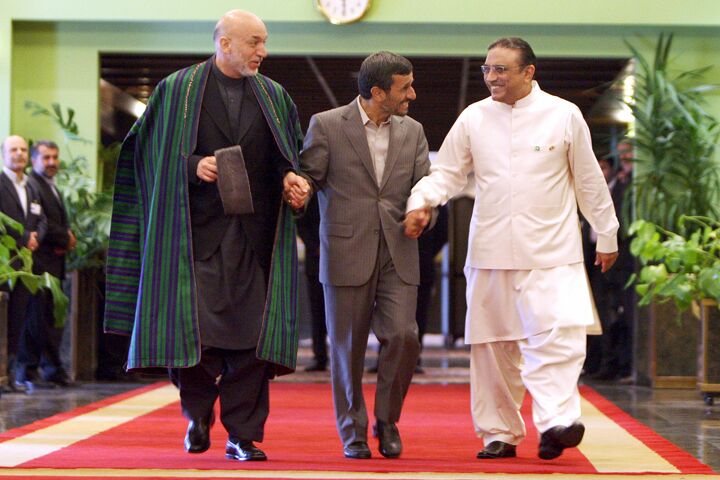
Iran, Afghanistan and Pakistan Leaders Meet in Tehran
The leaders of Iran, Afghanistan and Pakistan gathered in Tehran on Sunday to discuss the Taliban insurgency in Afghanistan and Pakistan. This meeting, hosted by Iranian President Mahmoud Ahmadinejad and revolving around a subject central to U.S. foreign policy, ought to deeply concern the Obama administration.
The fact that Iran is hosting this summit gives it automatic significance, wrote Stratfor (May 24; emphasis mine throughout):
Iran is in the process of emerging as a regional player, especially in Afghanistan, where the United States has called on Iran to play a role in the fight against the growing Taliban insurgency. Despite Iran’s participation in the U.S.-sponsored international meeting on Afghanistan held in The Hague on March 31, and despite efforts by the Obama administration to engage the clerical regime, gridlock persists between Washington and Tehran. There is no shortage of issues on which the two sides continue to clash. … In short, Tehran would like to be able to consolidate its position in the region before becoming part of a broader international effort in Afghanistan.
By establishing itself as a key player in both Afghanistan and Pakistan, Tehran is gaining leverage over Washington, showing its potential to succeed where the U.S. has failed. Stratfor continued:
With a growing realization within the region that the United States and its nato allies will not find success in their struggle against the Taliban insurgency, and that they will not have a long-term commitment to the issue, the three capitals are increasingly moving toward seeking a regional solution. This is their neighborhood after all, and they certainly do not want jihadist non-state actors undermining regional security and stability.
The emergence of an Afghanistan/Pakistan/Iran axis led by Tehran comes with potentially terrifying consequences for America, Israel and the West as a whole. The region is already the primary breeding ground of Islamic terrorism. Although the three nations issued an agreement to combat terrorism, individually each of these states has done little to curb Islamic terrorist activity within its borders. Collectively, and under the leadership of Iran, the world’s number-one state sponsor of terrorism, such an axis would likely facilitate the expansion and success of regional terrorist organizations.
Already there is evidence of collusion among the states. The Indian and Israeli press have reported that Pakistan may have helped Iran develop the medium-range Sejil-2 missile that it test launched on May 20.
Pakistan has nuclear bombs. The U.S. and Israel will be in serious trouble if Islamabad helps Iran out with more weapons programs.
Then there’s Afghanistan. “As Iran moves to consolidate its influence in Baghdad via Tehran’s Iraqi Shiite allies,” Stratfor wrote, “it is very much interested in projecting power in Afghanistan, especially given the deep U.S., Pakistani and Saudi involvement there. Iran also knows that it needs all the levers it can amass for use in its wider dealings with the United States and over Iraq, and Afghanistan is a major card in Iran’s hand.”
Iran’s growing relationship with Afghanistan and Pakistan, and its mounting preeminence in the region, do not bode well for America. Tehran is gaining significant leverage over U.S. interests there, which is giving it greater power in the broader Tehran-Washington relationship.
Iran is emerging as a major power in the area. For more information on this, read our booklet The King of the South.
